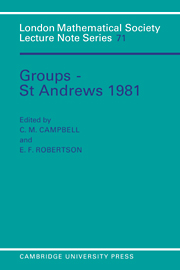Book contents
- Frontmatter
- Contents
- Preface
- Twenty-five years of Groups St Andrews Conferences
- Original Introduction
- 1 An elementary introduction to coset table methods in computational group theory
- 2 Applications of cohomology to the theory of groups
- 3 Groups with exponent four
- 4 The Schur multiplier: an elementary approach
- 5 A procedure for obtaining simplified defining relations for a subgroup
- 6 GLn and the automorphism groups of free metabelian groups and polynomial rings
- 7 Isoclinisms of group extensions and the Schur multiplicator
- 8 The maximal subgroups of the Chevalley group G2(4)
- 9 Generators and relations for the cohomology ring of Janko's first group in the first twenty one dimensions
- 10 The Burnside group of exponent 5 with two generators
- 11 The orientability of subgroups of plane groups
- 12 On groups with unbounded non-archimedean elements
- 13 An algorithm for the second derived factor group
- 14 Finiteness conditions and the word problem
- 15 Growth sequences relative to subgroups
- 16 On the centres of mapping class groups of surfaces
- 17 A glance at the early history of group rings
- 18 Units of group rings: a short survey
- 19 Subgroups of small cancellation groups: a survey
- 20 On the hopficity and related properties of some two-generator groups
- 21 The isomorphism problem and units in group rings of finite groups
- 22 On one-relator groups that are free products of two free groups with cyclic amalgamation
- 23 The algebraic structure of ℵ0-categorical groups
- 24 Abstracts
- 25 Addendum to: “An elementary introduction to coset table methods in computational group theory”
- 26 Addendum to: “Applications of cohomology to the theory of groups”
- 27 Addendum to: “Groups with exponent four”
- 28 Addendum to: “The Schur multiplier: an elementary approach”
Original Introduction
Published online by Cambridge University Press: 07 September 2010
- Frontmatter
- Contents
- Preface
- Twenty-five years of Groups St Andrews Conferences
- Original Introduction
- 1 An elementary introduction to coset table methods in computational group theory
- 2 Applications of cohomology to the theory of groups
- 3 Groups with exponent four
- 4 The Schur multiplier: an elementary approach
- 5 A procedure for obtaining simplified defining relations for a subgroup
- 6 GLn and the automorphism groups of free metabelian groups and polynomial rings
- 7 Isoclinisms of group extensions and the Schur multiplicator
- 8 The maximal subgroups of the Chevalley group G2(4)
- 9 Generators and relations for the cohomology ring of Janko's first group in the first twenty one dimensions
- 10 The Burnside group of exponent 5 with two generators
- 11 The orientability of subgroups of plane groups
- 12 On groups with unbounded non-archimedean elements
- 13 An algorithm for the second derived factor group
- 14 Finiteness conditions and the word problem
- 15 Growth sequences relative to subgroups
- 16 On the centres of mapping class groups of surfaces
- 17 A glance at the early history of group rings
- 18 Units of group rings: a short survey
- 19 Subgroups of small cancellation groups: a survey
- 20 On the hopficity and related properties of some two-generator groups
- 21 The isomorphism problem and units in group rings of finite groups
- 22 On one-relator groups that are free products of two free groups with cyclic amalgamation
- 23 The algebraic structure of ℵ0-categorical groups
- 24 Abstracts
- 25 Addendum to: “An elementary introduction to coset table methods in computational group theory”
- 26 Addendum to: “Applications of cohomology to the theory of groups”
- 27 Addendum to: “Groups with exponent four”
- 28 Addendum to: “The Schur multiplier: an elementary approach”
Summary
An international conference ‘Groups - St. Andrews 1981’ was held in the Mathematical Institute, University of St. Andrews during the period 25th July to 8th August 1981. The main topics of the conference: combinatorial group theory; infinite groups; general groups, finite or infinite; computational group theory are all well-represented in the survey and research articles that form these Proceedings. Four courses each providing a five-lecture survey, given by Joachim Neubüser, Derek Robinson, Sean Tobin and Jim Wiegold have been expanded, subsequently, into articles forming the first four chapters of the volume. Many of the themes in these chapters recur in the survey and research articles which form the second part of the volume.
Methods and techniques such as homology, geometrical methods and computer implementation of algorithms are used to obtain group theoretical results. Computational methods are surveyed in several articles in particular the major survey by Joachim Neubüser and find application in papers on Burnside groups and finite simple groups. In fact Burnside groups are discussed in two rather different papers, a survey of groups of exponent four by Sean Tobin and a major contribution to the exponent five case by Marshall Hall and Charles Sims. Derek Robinson exploits the way in which cohomology groups arise in group theory to establish some splitting and near-splitting theorems. Rudolf Beyl also uses homological techniques to discuss group extensions.
- Type
- Chapter
- Information
- Groups - St Andrews 1981 , pp. xiii - xivPublisher: Cambridge University PressPrint publication year: 1982



